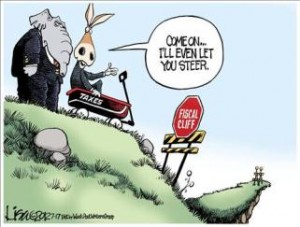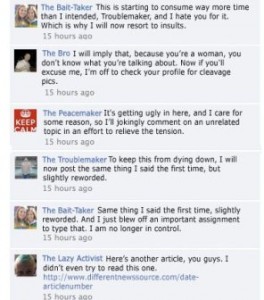 The political arguments on Facebook have pretty much ground to a halt. There are a few jabs here and there regarding basic philosophical differences between sides, but the daily attacks on what politicians have said, not said, done, or have not done, have pretty much fallen by the wayside.
The political arguments on Facebook have pretty much ground to a halt. There are a few jabs here and there regarding basic philosophical differences between sides, but the daily attacks on what politicians have said, not said, done, or have not done, have pretty much fallen by the wayside.
I’m going to be really honest…I kind of miss it. Someone asked me right after the election, “What are you going to write about now?”
I responded quickly with, “Don’t worry, there is still a lot of work to be done” and although that statement is undeniably true, I have to admit that I was concealing a bit of remorse at not having Mitt Romney to kick around, and from not trying to persuade the uncommitted to commit to President Obama.
So…now WHAT?
NOW we get down to business. We have to outline the differences between parties, and we have to find the commonalities, as well, so that we can begin to work toward making alliances.
Great. Problem solved.
But wait…HOW do we do that? We’ve been so contentious for so long, we’ve created so many labels and categories for one another, and have insulted, branded, dismissed, and chastised each other for so many years, that an entire generation has grown into adulthood never having known anything close to bipartisan cooperation.
How did we get so far apart? The obstinate divide began, from where I’m perched, when Nixon’s devious paranoia turned what was a logical ideological divide into a conflict where we now viewed politics as a battle between good and evil. And while his successor Ford was a good man, who, in my opinion, deserved to be elected in 1976, he carried the stain of having been Nixon’s VP and he could not inspire voters.
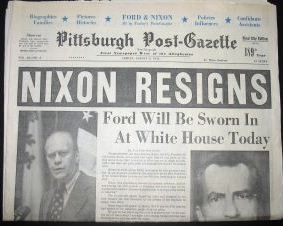
Liberal confidence was short lived, however, with the election of Ronald Reagan. Reagan was drawn from an almost mythical version of American Conservatism and with the emergence of “Reagan Democrats,” the left wing essentially gave up trying to differentiate their policies from his. Even though fantastic people like Walter Mondale and Michael Dukakis came forward, they were, nevertheless, milquetoast as candidates who represented the new meandering middle.
It wasn’t until a guy named Bill Clinton, who had the charisma to charm the disenfranchised center into believing again and his ability to turn supply side economics into a machine for social progress that the Neo-Cons became scared themselves. And this is where the era of bloody political cage matches began. With the simultaneous explosion of the internet, the discourse became truly hostile, and anti-left/anti-right hysteria would never again loosen its grip.
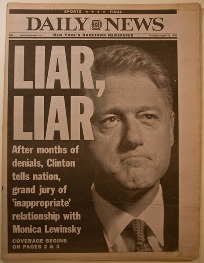
So I ask the question again. How do we overcome what we have said about each other, how do we come together, shake hands, and get on with the business of solving America’s problems?
We start by posting, emailing, and calling each other and saying, “I’m sorry for the times when I became so frustrated that I may have belittled your positions when you opposed mine.”
And don’t expect an apology in return, just be happy with taking the high ground. Then consider that we share common goals and we all want the best America possible for ourselves, our children and future generations. We just don’t agree on how to get there.
But, we CAN get there. We get there by talking to each other in bars, at supper tables, and backyard barbeques.  We tell each other what is important to us individually. If its “clean air and water, better schools, a more stable economy, or more jobs” we will find that most people will agree with basic premises. When we agree on those, we can go issue by issue.
We tell each other what is important to us individually. If its “clean air and water, better schools, a more stable economy, or more jobs” we will find that most people will agree with basic premises. When we agree on those, we can go issue by issue.
When we agree that “a more stable economy is essential to strength and securing our freedom” imagine someone saying, “I think we need to look at the size of the middle class and look at where the money has been going, and find ways to strengthen the consumer.”
Another could add, “When we allow for entrepreneurship to thrive by removing restrictive taxes and regulations, then American commerce will flourish again and that creates jobs.”
Now, someone asks, “What tax breaks have been given already? Why do we need more?”
Civil debate, continues: “Have loosened regulations made consumers too vulnerable? Are some regulations necessary?”
“Can we find accurate information to support our theories about how, and to whom, money has been circulated?”
“What kind of debt can this economy endure and what are the real costs?”
“What are the government programs that you think aren’t necessary?”
“Have you ever benefitted from welfare?”
“What does ‘For the Common Good’ mean, anyway?”
Here’s hardest part….do research that doesn’t support what you have previously believed. Look for what a Senator or Congressperson from the OTHER side has done, someone you may even dislike, that has been positive for their constituents. Everyone got elected because some people must have liked them. I voted against John McCain, but I like John McCain. I deride George W. Bush, but I was a resilient American when he was my president during 9/11. I like the way Governor Christy placed his state above politics in the wake of Frankenstorm.
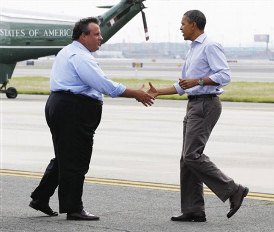
I’m being a little pedestrian here, but frankly…going back to the basics of civility is what we all need to do.
Let’s shake hands. We can talk about something other than politics first, and then we can inch toward topics like welfare, military spending, immigration, gay rights, foreign policy and taxes.
This would be a good time to create a new model for discussions and conversations, rather than hostile debates and arguments that no one ever concedes, anyway.